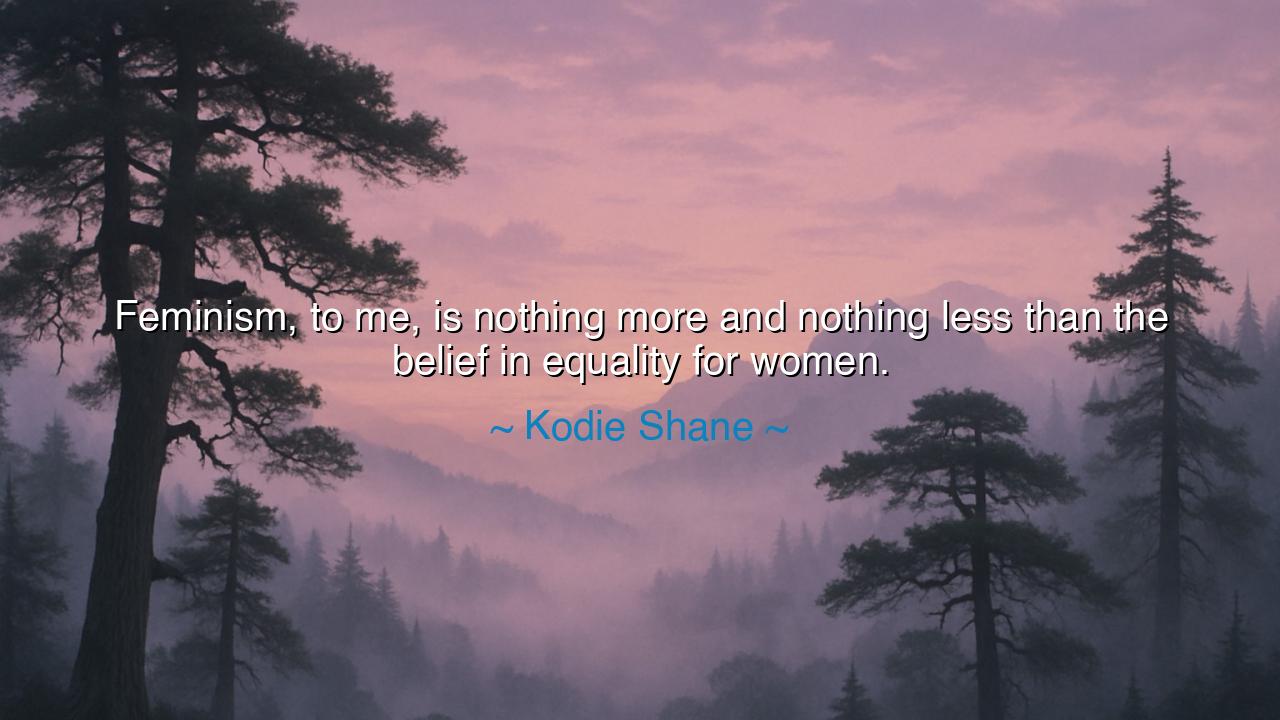
Feminism, to me, is nothing more and nothing less than the belief
Feminism, to me, is nothing more and nothing less than the belief in equality for women.






"Feminism, to me, is nothing more and nothing less than the belief in equality for women." These simple yet profound words from Kodie Shane are a reminder of the power and clarity inherent in the belief that all women deserve equality in every realm of life. The essence of feminism is not found in labels or divisive rhetoric, but in a fundamental truth: women, as human beings, are entitled to the same rights, opportunities, and recognition as men. To embrace feminism is not to seek superiority over men, but to demand the fairness and respect that should be inherent in any just society.
Throughout history, the notion of equality for women has been a dream often deferred, a battle fought and re-fought by countless individuals who believed in the intrinsic worth of women. In the ancient world, women's roles were often relegated to the shadows of society, confined to domestic duties and denied the rights afforded to their male counterparts. Aristotle, though a philosopher revered for his contributions to logic and ethics, held the belief that women were inherently inferior to men, a view that was widely accepted in the societies of his time. And yet, even within this deeply patriarchal framework, there were those who recognized the value of equality. The great Greek poet Sappho, despite living in a world where women’s voices were marginalized, rose to prominence as a writer whose work is celebrated to this day, reminding us that the call for equality and respect has always been part of the human spirit.
Fast forward to the modern era, and equality for women has become a cornerstone of the fight for justice and human rights. The suffragists of the 19th and early 20th centuries, such as Susan B. Anthony and Elizabeth Cady Stanton, were among the first to formalize the fight for equality in the United States, demanding the right to vote for women. Their struggle was not one of rebellion against men, but of striving to be treated equally—to have their voices heard in the decisions that affected their lives. Their work was not just a fight for women’s political rights, but a declaration that women, like men, had the right to shape society.
The belief in equality for women is not an abstract concept or a fleeting movement—it is the foundation upon which a just and harmonious society is built. Kodie Shane’s words echo the simplicity of this truth. To believe in feminism is to believe in the fundamental fairness of treating all people, regardless of gender, with the same respect and opportunity. The struggle for women’s rights is not something that should be seen as a women’s issue alone; it is a human issue—one that calls on all people to recognize the inherent dignity of every human being. The fight for equality is not a fight for women alone, but for the betterment of humanity as a whole.
Consider the powerful example of Malala Yousafzai, whose fight for girls' education in the face of violence and oppression became a global symbol for the struggle for equality. Malala’s advocacy was not just about education for women—it was about recognizing the basic right of every individual, regardless of gender, to have access to knowledge and opportunity. Her courage in standing against the forces that sought to silence her was not just an act of defiance; it was a call to the world to acknowledge that the pursuit of equality for women is not a matter of preference, but a necessity for the progress of all people. In Malala, we see the embodiment of Kodie Shane’s definition of feminism—a belief in the fundamental equality of all people, not just a cause, but a truth that must be lived every day.
The message of Kodie Shane is clear: feminism is not a complicated ideology or a political weapon; it is simply the belief in equality for women—a belief that should be so deeply ingrained in every human heart that it requires no explanation, no debate. It is a belief that should be so natural that it doesn’t require labels or movements to defend it; it should be self-evident to all. To believe in equality is to believe in justice and fairness for all people. It is to say that women deserve the same rights, recognition, and opportunities as men, in the workplace, in politics, in the home, and in society at large.
The lesson for future generations is this: feminism is not a radical or extremist belief. It is a rational and natural belief in the equality of all human beings, regardless of gender. To embrace equality for women is to stand for justice, not just for one group, but for humanity as a whole. The fight for equality is not just a battle to be fought by women; it is a battle that requires the support of everyone who believes in the inherent worth and dignity of every individual. As you move forward, remember that equality is not an option—it is a necessity. Stand firm in your belief in justice for all, and know that when you fight for equality, you are fighting for the very soul of society.






AAdministratorAdministrator
Welcome, honored guests. Please leave a comment, we will respond soon